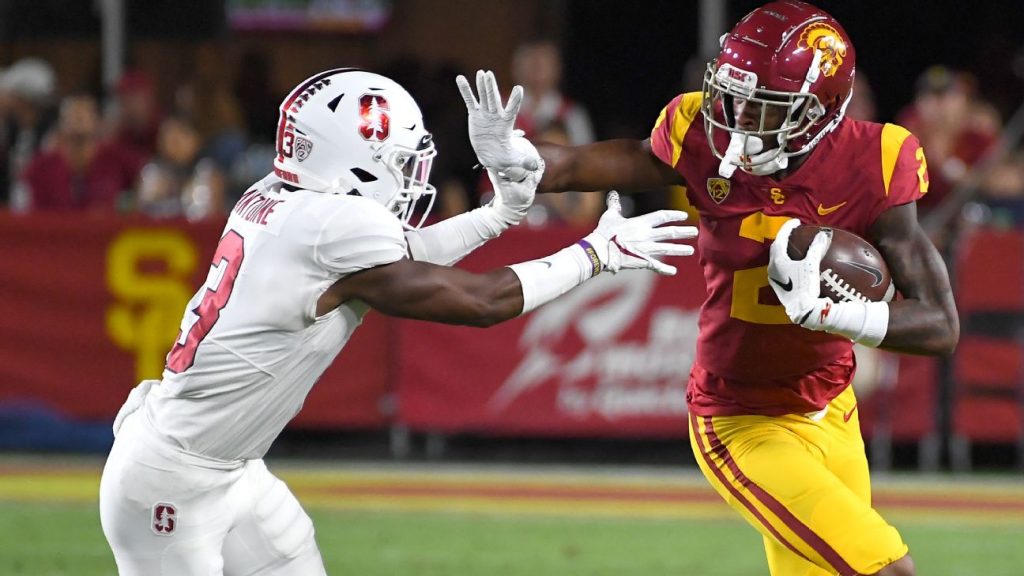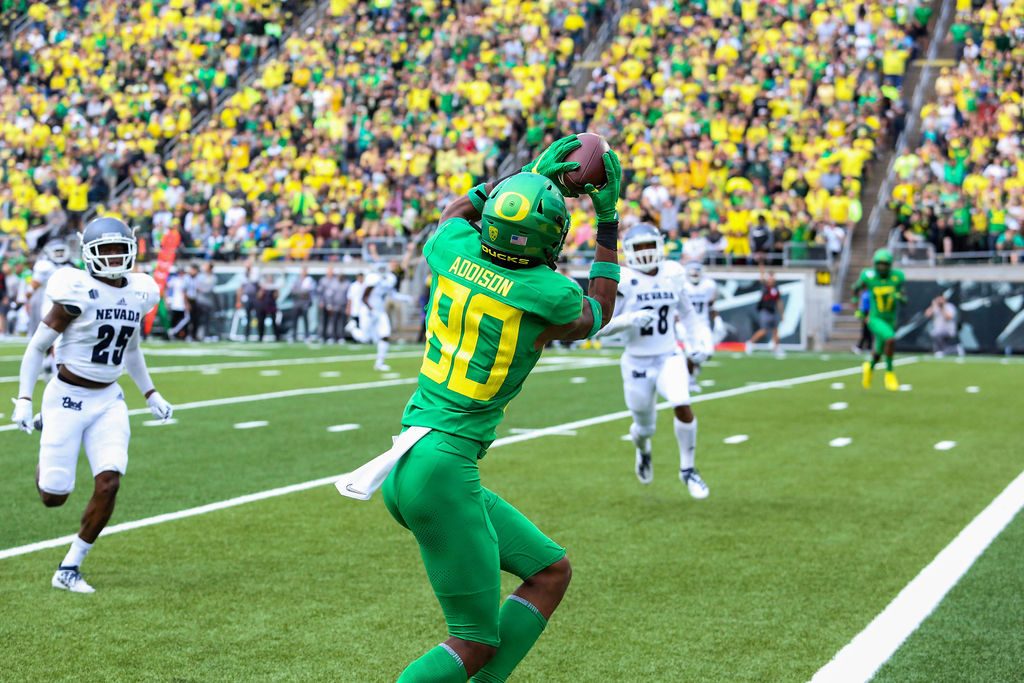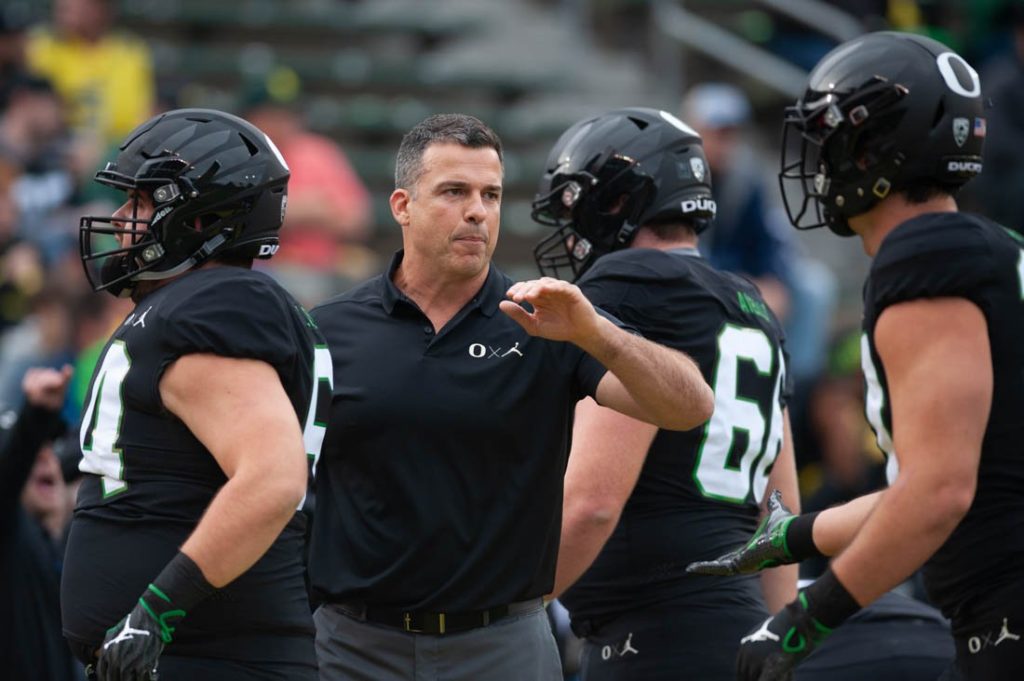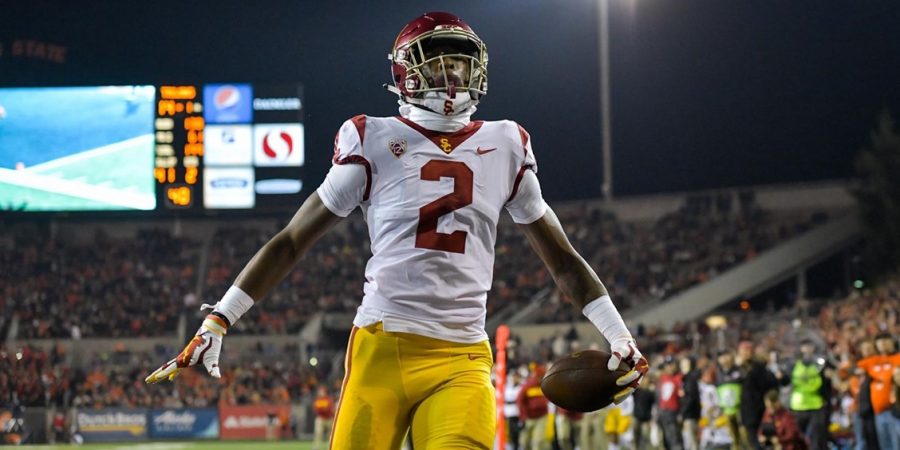There’s been no secrets surrounding Oregon’s issues at wide receiver. Whether it’s general ineffectiveness (particularly last year) or the dizzying number of injuries the Ducks have suffered at the position since fall camp broke in August, Oregon’s shortcomings at receiver have been a protracted storyline that has yet to come full circle.
The good news, however, is that Oregon’s receivers appear to be markedly improved from a season ago and they should be receiving a major shot in the arm as Juwan Johnson (calf), Brenden Schooler (foot), and Mycah Pittman (shoulder) are all scheduled to return from injury within the next few weeks.
There’s also the bit news out of Los Angeles. On Wednesday, it was reported that former four-star wide receiver Devon Williams – once ranked as the no. 6 wide receiver during the 2018 recruiting cycle – has decided to transfer from USC and officially enter the NCAA transfer portal.
Prior to his commitment to the Trojans in February of last year, Williams was the subject of an intense recruiting battle between USC and Oregon. In fact, in the days leading up to his decision, many had expected the Ducks to land Williams, who would have served as Oregon’s highest-rated commitment in their 2018 class just ahead of Penei Sewell.
Instead, Williams elected to stay close to his Lancaster (Calif.) home, and would go on to appear in 13 career games for the Trojans, catching just five passes for 98 yards and a touchdown during that span.
Now Williams begins his search for a new home, and as many expect, Oregon figures to be at or near the top of his list of potential final destinations. Below, WFOD examines the case for and against the pursuit of Williams, who likely wouldn’t be eligible to play until next season.

Why Oregon should pursue Devon Williams
As mentioned, the situation at receiver for the Ducks over the past 12 months has been dire – and for different reasons. In 2018, this unit was generally plagued by drops and mediocre play. So far this season, the play of Oregon’s receivers has noticeably improved, though depth has been a major concern with the injuries that have been sustained over the last several weeks. The Ducks figure to get healthier over the next month or so, though the they still have considerable inexperience at the position projecting ahead.
At season’s end, Oregon is guaranteed to lose both Juwan Johnson and Schooler to graduation, leaving Johnny Johnson, Jaylon Redd, Bryan Addison, Mycah Pittman, and Josh Delgado as the top returnees. Spencer Webb and Daewood Davis could also join this group next season, though both players have been moved from tight end and cornerback, respectively, to provide depth for this decimated unit. True freshmen JR Waters and Lance Wilhoite are also expected to contribute to this group next season, though both are currently nursing injuries that have prevented them from seeing the field this season. Meanwhile, Isaah Crocker and JJ Tucker have yet to make any notable contributions since arriving in Eugene two summers ago.
By adding Williams, the Ducks would add experienced depth to a group that is still largely wet behind the ears. Not only that, but at 6-foot-4 and 210 pounds, Williams’ presence provides the Ducks with another big, athletic body that could seriously stress opposing defenses, particularly in the red zone, even as fellow big bodies in Johnson and Schooler exit the program.

Why Oregon shouldn’t pursue Devon Williams
As young and inexperienced as Oregon’s receivers currently are, most of the group that is set to return in 2020 is gaining valuable experience as we speak. Johnny Johnson and Jaylon Redd have assumed leadership roles admirably despite the rash of injuries that have comprised the Ducks’ depth. Both players will be even more wizened next season as they enter their senior seasons. Similarly, Addison and Delgado figure to have their roles expanded even more as they enter their sophomore years with presumably just as much experience under their belts compared to Williams. Same goes for Pittman, who may prove to be the best receiver on the roster once he fully heals from the shoulder injury he suffered during fall camp.
Meanwhile, through two games, Webb and Davis have already made noteworthy plays since being thrust into new roles over the past several weeks, as each has notched a touchdown reception. Waters and Wilhoite are talented prospects in their own right, and when healthy, both players are expected to make serious pushes for playing time. The Ducks are also expected to add at least two more highly-touted freshmen from their 2020 recruiting class in four-star prospects Kris Hutson and Johnny Wilson.
As intriguing an athlete as Williams is, it’s not necessarily guaranteed that he’ll have a wide open opportunity to contribute the moment he arrives on campus. In fact, his year of collegiate experience aside, he’ll be just as new to the Oregon program as Hutson or Wilson, meaning he’ll have just as much to prove as those two true freshmen once he gets to Eugene.

WFOD’s opinion
Adding Williams to the roster isn’t the slam dunk it appears to be at first glance. Yes the Ducks have had their fair share of struggles at wide receiver the past year or so, but the long-term forecast has never looked better considering the way in which the receivers on the roster have developed since last season, not to mention the way in which Mario Cristobal is recruiting across the board. With talent acquisition and development no longer seeming to be the lingering issue it once was, the Ducks are in a much less desperate position to add talent via transfer.
Of course, much of this will depend on Oregon’s evaluation of Williams (remember, receivers coach Jovon Bouknight was not a member of this staff during Williams’ recruitment), as well as their evaluation of the talent both currently, and expected to be, on the roster once the 2020 class is signed. On that note, it’s also worth pointing out that the Ducks, with 19 scholarships available for next season, currently have 19 verbal commits to their 2020 recruiting class. That means that, as of now, there’s no room to add any more players unless there are a handful of underclassmen who decide to enter the draft, or leave the program. There will surely be attrition, though how much exactly is anyone’s guess.
With all that in mind, we’re of the opinion that the Ducks should pass on Williams and focus instead on the receivers they have. There’s no questioning Williams’ athletic gifts, and truth be told, had he made this decision a month ago, we likely would have been singing a different tune. However, it’s hard not to be impressed with what’s been seen from Oregon’s receivers this season. Assuming everyone on the current roster returns and continues progressing along their current trajectory, while players like Hutson and Wilson live up to their tremendous potential, it seems that using a scholarship on Williams would only take away from a position who may have a greater need for a talent infusion.

